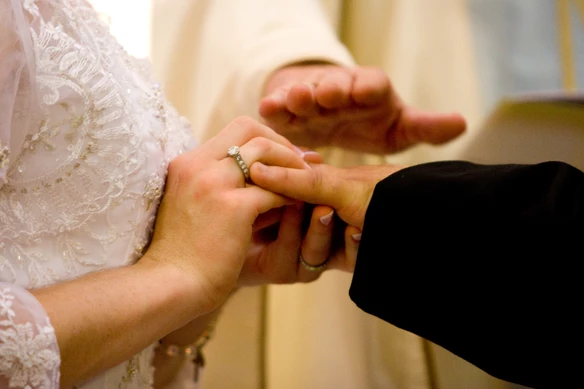Faith Hakesley shares how she handles marriage after abuse.
This month, my husband and I are celebrating 12 years of marriage. Actually, our anniversary also falls on the Catholic feast day of Corpus Christi this year. For those of you who aren’t familiar with this feast, it celebrates the Real Presence of the Body and Blood, Soul and Divinity of Jesus Christ in the Holy Eucharist. Although much of this is a mystery and it’s something that we believe because we have God’s word for it, it is a belief that is central to being a Catholic and so this feast day is near and dear to our hearts as a Catholic family. There is nothing more important, nothing more vital to the life of a Catholic than the Eucharist! Our faith and the sacraments have played a huge role in our married life.

What an insane ride these last twelve years have been, full of some really beautiful, awesome times and also some very difficult times. I don’t think any marriage can be classified as “easy” – every relationship comes with its challenges, its joys, suffering and crosses. Ours has certainly been no different, and our marriage has had its fair share of ups and downs. Some of those downs have been due to my history with sexual abuse. Both Alex and I have had a lot to learn about ourselves and about one another, and I thought that I would take a little time to talk a bit about marriage after sexual abuse.
The road is difficult and different for each couple and healing varies from person to person, but I want to reassure you that it is possible to overcome trauma and to do it together. I was fortunate enough to have already begun my healing journey before getting married but Alex became a very important part of that journey. Falling in love was completely unexpected for me. Alex was my oldest brother’s best friend and for a long time I had viewed him as a big brother. When my brother, Matt, passed away suddenly from a heart condition in 2001, Alex remained close to my family. We started commuting together for college classes and were in a few of the same classes. Our friendship soon blossomed into something more, and it was scary, exciting, and somewhat unbelievable for me in the beginning.
Following the sexual abuse I endured by a Catholic priest at my parish when I was fifteen, marriage and children were gifts I felt totally undeserving of. “Why would anyone want to marry me now?” were the words frequently haunting my traumatized mind. Men and women who have been abused or raped often feel like “damaged goods” and it takes a rare and special individual to be willing to accept and share in the healing process. I think this is true when anyone entering into marriage has endured any kind of traumatic or difficult experience. Although our past does not define us by any stretch, our experiences shape who we are and so, by marrying someone, we are essentially accepting any repercussions of their past (the good and the bad). The added component of sexual abuse certainly creates some unique challenges for a couple but a spouse can become a powerful healing partner.
As Alex’s and my friendship blossomed into a much deeper love, I helped him to understand what I was going through as did my parents, family, and therapist. He was able to ask the questions he needed, do whatever research he needed to do and, therefore, support me. This was not easy because, quite frankly, he really didn’t have a clue. My parents had had a few years to “train” and they were used to me, my triggers, they understood a lot about sexual abuse and its repercussions, and they knew how to handle things. Alex was like a fish out of water but he was willing to learn and willing to take on a part of the burdens I carried. Although he began to become a part of the healing process, we did have to develop our own boundaries so that I could continue to heal without him feeling as though he could somehow fix it all. Let’s face it – when we care about someone, we want to “make it better.” We want to fix any problems our loved ones have and erase their suffering but, unfortunately, that’s not realistic.
If you’d like to ask Faith a question, please email her at AskASurvivor@ruthinstitute.org.



